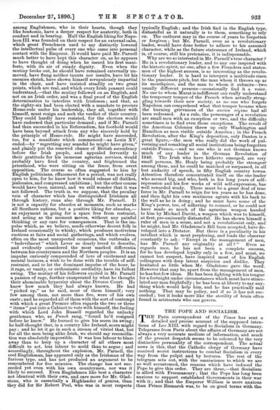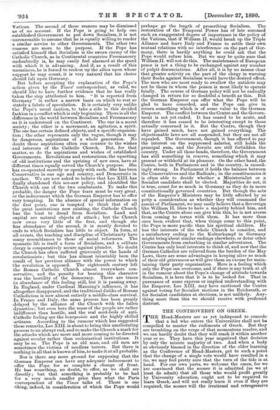THE POPE AND SOCIALISM. Vatican. The second of these reasons
may be dismissed as of no account. If the Pope is going to help one .established Government to pat down Socialism, it is not :unreasonable to assume that he is equally willing to render - a similar service to other Governments, The other two ,reasons are more to the purpose. If the Pope has -satisfied himself that Socialism is the sworn enemy of the Catheilic Church, as in Continental countries Freemasonry undoubtedly is, he may easily feel alarmed at the speed with which it is advancing. And if, as a result of this uneasiness, he is forced to reckon up the allies upon whose support he may 'count, it is very natural that his choice should fall upon Germany. But before accepting the explanation of the Pope's action given by the Times' correspondent, as valid, we .should like to have further evidence that he has really taken the step attributed to him. " It is reported from Germany " is rather a narrow basis on which to rest so stately a fabric of speculation. It is certainly very unlike the Pope's usual caution, to take a side in this decided fashion in a conflict which is only beginning. There is all the difference in the world between Socialism and Freemasonry as it is understood on the Continent. The one is a secret society ; the other is a movement, an agitation, a spirit. 'The one has certain defined objects, and a specific organisa- tion ; the other represents only the vague, though it may -he dangerous, aspirations of a whole generation. No doubt these aspirations often run counter to the wishes :and interests of the Catholic Church. But, for that -matter, so do the aspirations and wishes of established Governments. Revolutions and restorations, the upsetting -of old institutions and the uprising of new ones, have at different times equally served the Church's purpose. She has co-operated secretly or openly with each. She has been Conservative in one age and country, and Democratic in -another. We are now asked to believe that Leo NITT has finally abandoned this see-saw policy, and identified the Church with one of the two combatants. To make this probable, the danger the Pope fears must be very great, or the inducement which the German Emperor has to offer very tempting. In the absence of special information on the first point, one is tempted to think that of all the great institutions now existing, the Catholic Church has the least to dread from Socialism. Land and capital are natural objects of attack ; but the Church now owns very little of the first, and though she has abundance of the second, it is mostly devoted to Nor is there any more ground for supposing that the German Emperor can have any adequate inducement to offer the Pope for so complete a change of front. He has something, no doubt, to offer, as we shall see directly; but that something is probably to be had for a very much smaller price than what the Paris correspondent of the Times talks of. There is one eking, indeed, in consideration of which the Pope would perhaps go the length of proscribing Socialism The restoration of the Temporal Power has of late assumed such an exaggerated degree of importance in the policy of the Vatican, that if William II. would break up the Triple Alliance and leave Italy and France to settle their own mutual relations with no interference on the part of Ger- many, there is hardly anything he could. ask that the Pope would refuse him. But we may be quite sure that William IL will not do this. The maintenance of European peace is not a thing to be exchanged against any number of pulpit denunciations. After all, it is by no means clear that greater activity on the part of the clergy in warning their flocks against Socialism would have the desired effect. The men who are most ready to swallow the antidote may not be those in whom the poison is most likely to operate fatally. The course of German policy will not be radically changed in return for so doubtful a benefit as this. But the German Emperor can offer what the Pope will be glad to have conceded, and the Pope can give in return something which is of some value to the German Emperor. The conflict between the Centre and the Govern- ment is not yet ended. It has ceased to be acute, and therefore it has ceased to be interesting except to those actually concerned in it. But the Centre, though they have gained much, have not gained everything. The objectionable laws are all suspended, but they are not all repealed. The Government, though it has offered to pay the interest on the suppressed salaries, still holds the principal sum, and the Jesuits are still forbidden the country. Under all these heads, therefore, the Government has still something in reserve, something which it may present or withhold at its pleasure. On the other hand, the Centre, both in Parliament and in the country, is exceed- ingly strong. In Parliament it holds the balance between the Conservatives and the Radicals ; in the constituencies it is often able to decide whether a Ministerialist or a Socialist candidate shall be elected. Majorities do not, it is true, count for so much in Germany as they do in more constitutionally governed countries. But though the acts of the Emperor's Ministers may be little affected by so petty a consideration as whether they will command the assent of Parliament, we may easily believe that a Sovereign like William II. likes to have a majority behind him, and that, as the Centre alone can give him this, he is not averse from coming to terms with them. It has more than once been evident that, when things come to this point, the Pope is more pacific than his spiritual children. He has the interests of the whole Church to consider, and a satisfactory ending to the Kulturkampf in Germany might bring about similar endings elsewhere, or deter ether Governments from embarking in similar adventures. The Centre has only local interests to think of, and now that the German Catholics are relieved from the burden of the May Laws, there are some advantages in keeping alive so much of their old grievances as will give them an excuse for main- taining their party organisation. Here is a feeling which only the Pope can overcome, and if there is any truth at all in the rumour about the Pope's change of attitude towards Socialism, it is here that it is to be looked for. That in pursuance of some express or implied understanding with the Emperor, Leo XT FT may have cautioned the Centre against voting for Socialist motions in the Reichsrath, or for Socialist candidates at elections, is not unlikely. Any- thing more than this we should receive with profound. distrust.



































 Previous page
Previous page